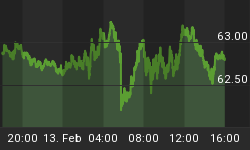Please consider these headlines.
Associated Press
Stocks Decline on Surge in Oil Prices
Thursday August 12, 10:34 pm ET
By Michael J. Martinez, AP Business WriterAssociated Press
Stocks Close Higher on Rising Oil Prices
Friday August 13, 8:15 pm ET
By Michael J. Martinez, AP Business Writer
No, you did not read a misprint. The headlines are real.
Yes, both stories came from the same AP Business Writer on consecutive days this past August.
And, yes, the two headlines amount to an absurd contradiction: One claims stocks fell because of rising oil prices, while a day later the other says stocks rose because of rising oil prices. Yet, as I said, the headlines introduced real news articles.
What gives, you say?
Good question, though it's easier to ask than to answer. So bear with me -- it will take a moment to undo a knot this tangled.
Indicate Your Obsession Here
Wall Street and the financial press are forever obsessed with some "indicator" that will explain what "drives" the stock market. If your memory is good, you may recall that in the 1980s, the weekly money supply report was the so-called indicator driving stocks. Others have come and gone, and come again: Inflation numbers, the Fed funds rate, consumer confidence... here, you fill in the blank. _______________.
You don't often see an example as laughable and logic-free as the headlines above, but that doesn't mean I'm unfairly exploiting an error or a rare exception. When it comes to how Wall Street and the media explain the stock market, absurd logic is the rule.
If you've taken a course in logic or even statistics, you know that "causality" can be truly hard to establish. But for our purposes here, I'll lower the bar and ask for proof that is no more formal than the sort of price charts that are readily available on the Internet.
Why? Simple: A price chart meets the "evidence beyond a reasonable doubt" standard used in courtrooms every day. Charts give you a record of what has happened, specifically the price movement over time for stock indexes -- like the S&P 500, and commodities -- like a barrel of crude oil. To have a chart is to have facts at your disposal. Whatever the so-called indicator may be, the truth about whether it "drives" the stock market is always as close as a price chart.
The contradiction in the example above aside, crude oil prices have been mostly higher in 2004 while the major stock indexes have been mostly lower -- thus the media's year-long formula, that "higher energy prices are bad for the stock market." Is it true?
Can You Say "Correlation"?
This first chart shows monthly prices of the S&P 500 stock index and Crude Oil over the past 20 years. You can study the respective price trends until your head spins. At times they appear to move inversely, such as when oil spiked up to $39.99 in 2003 as the S&P was near a low. In other long periods, they appear to move in union, such as the time leading to crude's $37.80 peak in 2000, when the S&P was also near a top.
In fact you can see almost anything you want to -- except a consistent correlation between this stock index and crude oil prices.

So there's no apparent relationship visually -- but is there one statistically? The next chart tries to identify a statistical correlation in the S&P 500 and crude oil in 10-week segments.
A true correlation would show up as a relatively flat line in either the upper (positive) or lower (negative) range of the correlation panel. Instead you see erratic, random swings, which is what you should see if there is no correlation whatsoever.

The third chart shows what you can discover by surveying several years of market-related headlines in a major financial newspaper, in this case London's Financial Times. On a given day, the news stories may say that rising or falling oil prices may help or may hurt the stock market. There's no rhyme or reason to the "analysis" in the articles, which is exactly the point.

The charts speak for themselves. The notion that "higher energy prices are bad for the stock market" is fiction poorly disguised as fact. The charts prove it beyond a reasonable doubt.
Who Is the Joke Really On?
It's no fun when you're the only one at the table who isn't laughing at the punch line of a joke that you didn't get.
But turn the scenario around: Suppose that no one except you "gets it" -- and instead of chuckling, you're actually shaking your head because the joke is so bad, and because everyone else at the table believes that a bad joke amounts to "serious information."
With this in mind, allow me to suggest that you should indeed be the person shaking your head over a bad joke that's been told repeatedly this year, namely that "record high oil prices" have been "driving down" the stock market.
Perhaps you're not persuaded by my perspective on this issue, and, of course, you're free to dismiss what I've said. But if the trend in the stock market matters to your finances, you cannot afford to dismiss the open-and-shut case that the charts present.
What's more, the benefit of the charts goes beyond the example of crude oil. After seeing them, you'll be the one shaking your head at ANY suggestion that some external cause is driving the stock market's internal trend.
The obsession with oil as an "indicator" will pass, eventually, and another will take its place. Yet in the meantime, being wrong is not the only hazard of following the conventional wisdom. The other danger is literally less visible. While the media (and far too many investors) act like the financial universe revolves around what's "driving" just one market, other real opportunities in other markets go unnoticed.
You can be one of those who notice them.
















